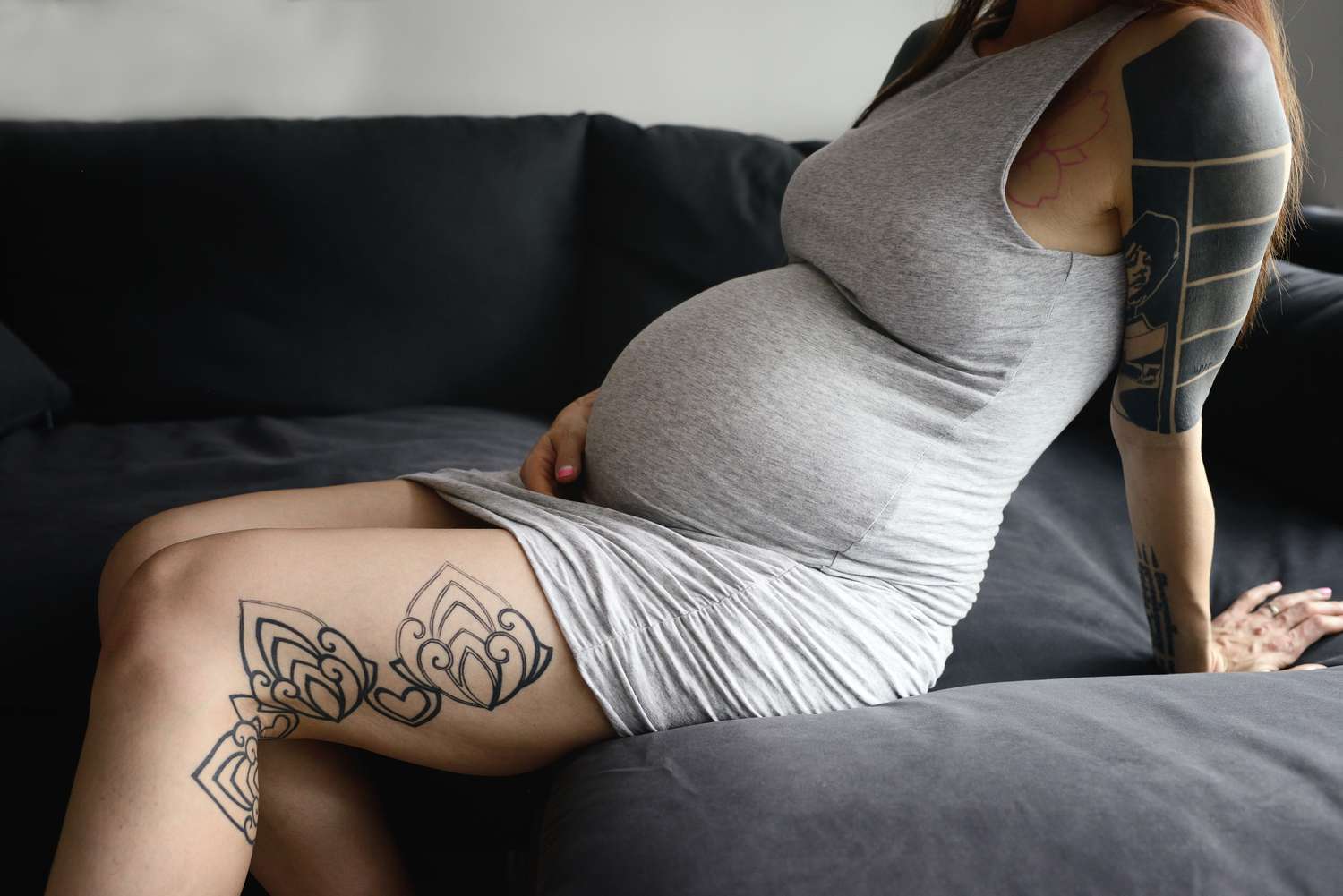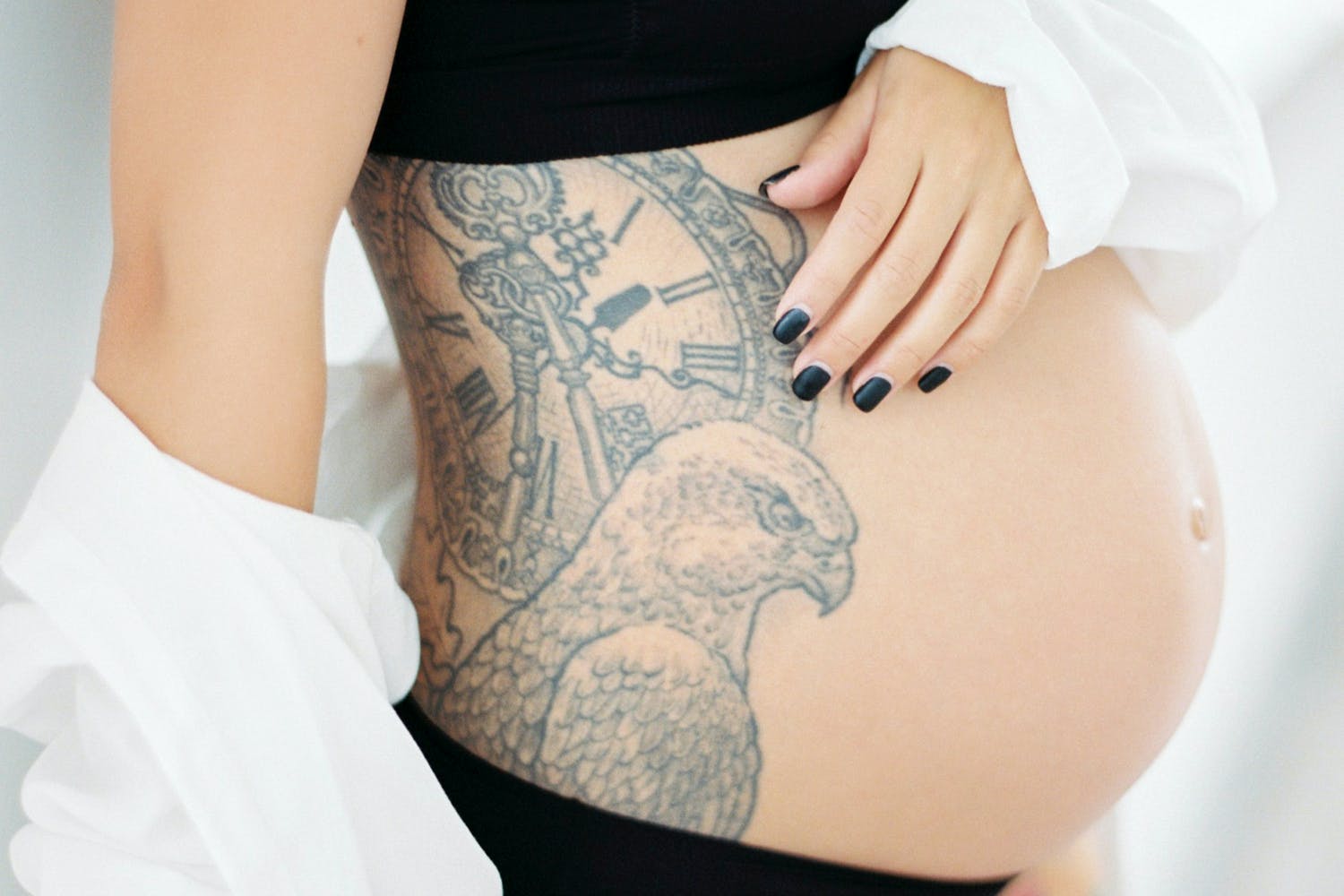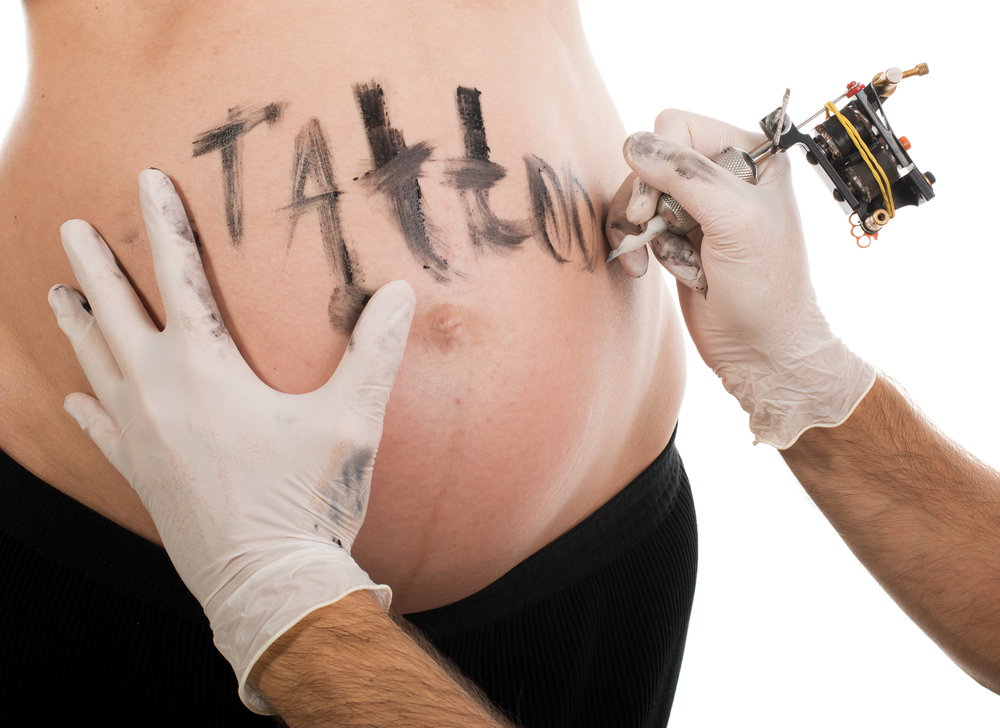Can you get a tattoo while pregnant? This question weighs heavily on many expecting mothers' minds, whether they're longtime tattoo enthusiasts or first-time clients seeking to commemorate their pregnancy journey. At H2M Tattoo Studio, we understand the emotional desire to mark this transformative time with meaningful body art, but we also prioritize the health and safety of both mother and baby above all else.
Understanding Tattooing During Pregnancy: Risks and Considerations
Pregnancy fundamentally changes how your body functions, and these physiological shifts have important implications for tattoo safety and healing. During pregnancy, your immune system undergoes significant modifications to prevent your body from rejecting the developing fetus. This natural immune suppression, while essential for a healthy pregnancy, can make you more susceptible to infections and slower to heal from wounds.
Your skin also experiences dramatic changes during pregnancy. Increased blood flow, hormonal fluctuations, and stretching can make skin more sensitive and prone to reactions. These changes don't just affect how a tattoo might look initially—they can impact the entire healing process and long-term appearance of the artwork.
Common concerns that bring expecting mothers to research this topic include:
-
Fear of infection affecting the baby
-
Uncertainty about pain medication safety during tattooing
-
Questions about whether tattoo ink can reach the fetus
-
Concerns about complications during an already vulnerable time
-
Desire to commemorate pregnancy with meaningful body art
Understanding these foundational changes in your body during pregnancy sets the stage for examining the specific medical risks that make most healthcare providers recommend waiting until after delivery and breastfeeding to get new tattoos.

>>>> READ MORE: what is a tattoo ? A Story Etched in Ink
Medical Risks Associated with Tattooing During Pregnancy
The medical community's caution regarding tattoos during pregnancy stems from several well-documented risk categories that pose potential threats to both maternal and fetal health.
Infection Risks
The most significant concern involves the risk of infections, which can be particularly dangerous during pregnancy. Your compromised immune system makes it harder to fight off pathogens that might enter through the tattoo wounds. Key infection risks include:
-
Bacterial infections: Staphylococcus and Streptococcus bacteria can cause serious skin and soft tissue infections
-
Viral infections: Hepatitis B, Hepatitis C, and HIV transmission through contaminated equipment
-
Bloodborne pathogens: Any infection that enters the bloodstream can potentially affect fetal development
-
Local skin infections: Even minor infections can become complicated during pregnancy due to immune system changes
Chemical Exposure Concerns
Tattoo inks contain various chemical compounds, many of which haven't been extensively studied for pregnancy safety. The concern isn't just about what goes into your skin—it's about what might reach your developing baby through your bloodstream.
Heavy metals like mercury, lead, and cadmium have been found in some tattoo inks, along with organic compounds and preservatives. While the amount that enters systemic circulation from a tattoo is generally small, the potential for any toxic exposure during critical fetal development periods raises legitimate safety concerns.
Allergic Reactions and Skin Sensitivity
Pregnancy hormones can heighten skin sensitivity and alter how your body responds to foreign substances. Women who've never had allergic reactions to certain materials might suddenly develop sensitivities during pregnancy. Red and yellow inks are particularly known for causing allergic reactions, and these responses can be more severe and prolonged in pregnant women.
The healing process itself becomes more complex during pregnancy. Your body's resources are focused on supporting fetal development, which can slow wound healing and increase the risk of complications like scarring or ink migration.
Pain Management Limitations
Tattooing involves significant discomfort, and the pain management options available to pregnant women are severely limited. Most topical anesthetics and pain medications used in tattoo procedures aren't recommended during pregnancy, meaning you'd need to endure the full discomfort without pharmaceutical relief.

>>>> SEE MORE: what are the benefits of getting a tattoo ? Are There Any Risks?
Timing Matters: How Pregnancy Stages Affect Tattoo Safety
The stage of pregnancy significantly influences both the risks involved and the potential consequences of getting a tattoo, making timing a critical factor in any decision-making process.
First Trimester: The Critical Period
The first trimester is universally considered the highest-risk period for getting a tattoo. During weeks 1-12, your baby's major organs, nervous system, and basic body structures are forming through a process called organogenesis. Any infection, fever, or toxic exposure during this period could potentially interfere with normal development.
Key first-trimester considerations include:
-
Heightened risk of birth defects from infections or chemical exposure
-
Morning sickness potentially complicating aftercare routines
-
Extreme fatigue affecting immune response and healing
-
Higher likelihood of miscarriage from stress or complications
Second Trimester: Reduced but Present Risks
The second trimester (weeks 13-26) is generally considered the "safest" period of pregnancy for elective procedures, but significant risks still remain for tattooing. While major organ formation is complete, your baby continues developing, and your immune system remains suppressed.
During this period, you might also experience:
-
Skin stretching that could distort new tattoo artwork
-
Continued sensitivity to chemicals and allergens
-
Positioning challenges as your belly grows
-
Ongoing infection risks, though slightly reduced
Third Trimester: Complications and Healing Concerns
The third trimester brings unique challenges that make tattooing particularly inadvisable. Your skin is stretching significantly, especially around the torso, which could severely distort any new artwork. Additionally, the physical discomfort of lying in tattoo positions becomes increasingly difficult.
Healing during the third trimester is also compromised by:
-
Reduced circulation to extremities
-
Increased swelling affecting wound care
-
Proximity to delivery date increasing infection risks
-
Potential complications that could interfere with labor and delivery
>>>> SEE MORE: can you get a tattoo with fake tan on ?
Expert Opinions and Medical Guidelines on Tattoos During Pregnancy
The medical consensus on tattooing during pregnancy is remarkably consistent across specialties and professional organizations. Leading dermatologists, obstetricians, and infectious disease specialists uniformly recommend postponing tattoos until after pregnancy and breastfeeding.
Dr. Jennifer Wu, an obstetrician-gynecologist at Lenox Hill Hospital, explains that "the risk-benefit analysis for tattoos during pregnancy simply doesn't favor getting one. The potential complications, while relatively rare, could have serious consequences for both mother and baby, while the benefit is purely cosmetic."
The American Pregnancy Association explicitly advises against tattoos during pregnancy, citing infection risks and unknown effects of tattoo inks on fetal development. Similarly, the American Academy of Dermatology recommends waiting until after breastfeeding to ensure no chemicals pass to the baby through breast milk.
Professional Tattoo Artist Protocols
Reputable tattoo parlors have their own guidelines regarding pregnant clients. Many refuse to tattoo pregnant women entirely, while others require:
-
Written physician approval
-
Signed liability waivers
-
First-trimester restrictions
-
Enhanced sanitization protocols
-
Modified positioning and session length accommodations
These protocols reflect the professional tattoo community's recognition of increased risks and liability concerns when working with pregnant clients.
Healthcare Provider Consultation Requirements
Before even considering a tattoo during pregnancy, medical experts unanimously recommend consulting with your healthcare provider. Your doctor can assess your individual risk factors, including:
-
Current health status and pregnancy complications
-
Immune system function
-
Previous reactions to tattoos or skin treatments
-
Medications that might affect healing or increase infection risk
This consultation should be comprehensive and honest, covering not just medical risks but also your motivations for wanting the tattoo and whether those goals might be better served by waiting.

>>>> READ MORE: Your Ultimate Guide: is it safe to get a tattoo in vietnam ?
Tattoo Aftercare for Pregnant Women
If, despite medical recommendations, you decide to proceed with a tattoo during pregnancy, aftercare becomes even more critical than usual. Proper wound care is essential for preventing complications that could affect both you and your baby.
Enhanced Hygiene Protocols
Pregnant women must be extraordinarily vigilant about tattoo aftercare hygiene:
-
Frequent hand washing: Always wash hands thoroughly before touching the tattoo area
-
Clean, dry bandages: Change protective coverings more frequently than typically recommended
-
Gentle cleansing: Use mild, fragrance-free soap and lukewarm water
-
Pat dry technique: Avoid rubbing or aggressive drying that could irritate healing skin
-
Clean environment: Ensure your healing space is free from pets, dust, and other contamination sources
Modified Aftercare Routines for Pregnancy
Standard tattoo aftercare must be adapted for pregnancy safety:
-
Avoid soaking: No baths, swimming pools, or hot tubs during healing (typically 2-4 weeks)
-
Pregnancy-safe products: Use only moisturizers and cleansers approved by your healthcare provider
-
Sleep positioning: Modify sleeping positions to avoid pressure on healing tattoos
-
Clothing choices: Wear loose, breathable fabrics to prevent irritation and allow air circulation
-
Sun protection: Pregnant skin is more sensitive to UV damage, making sun protection crucial
Warning Signs Requiring Immediate Medical Attention
Pregnant women should be especially alert to signs of complications requiring immediate medical intervention:
-
Fever above 100.4°F (38°C)
-
Red streaking from the tattoo site
-
Excessive swelling or warmth around the tattoo
-
Pus or unusual discharge
-
Severe or worsening pain beyond normal healing discomfort
-
Any signs of allergic reaction (widespread rash, difficulty breathing, swelling of face or throat)
These symptoms could indicate serious infections that pose risks to both maternal and fetal health and require prompt medical treatment.
Alternatives to Permanent Tattoos During Pregnancy
For expecting mothers who want to express themselves artistically or commemorate their pregnancy journey, several safe alternatives can satisfy creative desires without the medical risks of permanent tattoos.
Temporary Tattoo Options
Modern temporary tattoo options have evolved far beyond childhood novelties, offering sophisticated designs that can last weeks or months:
-
High-quality temporary tattoos: Professional-grade options using safe, FDA-approved inks
-
Henna tattoos: Natural henna (ensure it's pure henna without chemical additives) creates beautiful, temporary designs lasting 2-4 weeks
-
Airbrush tattoos: Professional airbrush artists can create detailed, temporary designs perfect for special occasions
Benefits of Waiting Until Postpartum
Postponing permanent tattoos until after pregnancy and breastfeeding offers several advantages beyond safety considerations:
Your immune system will have returned to normal function, reducing infection risks and improving healing capacity. Hormonal changes will have stabilized, making allergic reactions less likely and more predictable. Most importantly, you'll have time to thoughtfully consider designs that truly reflect your experience as a new parent.
Many women find that their perspective on potential tattoo designs changes significantly after becoming mothers. Waiting allows you to incorporate the actual experience of parenthood into your artistic vision, often resulting in more meaningful and personally significant artwork.
The postpartum period also allows your body to return to its pre-pregnancy state, ensuring that any tattoos will maintain their intended appearance without distortion from pregnancy-related skin changes.
Can you get a tattoo while pregnant? While it's technically possible, the overwhelming medical consensus—and our professional recommendation at H2M Tattoo Studio — is to wait until after pregnancy and breastfeeding. The potential risks to both mother and baby, from infections and allergic reactions to unknown chemical effects, simply outweigh any immediate benefits of getting inked during this crucial time.
>>>> NOTE LẠI NGAY:

